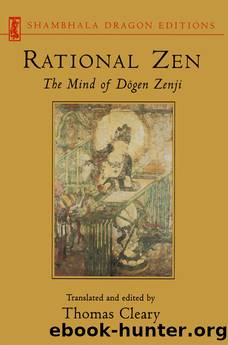Rational Zen by Thomas Cleary

Author:Thomas Cleary
Language: eng
Format: epub
Publisher: Shambhala
NOTES
DO NOT DO ANYTHING EVIL
1. What is evil, what is good? One of the greatest Chinese Zen masters was asked by a disciple, “What should I do?” The master said, “I won’t tell you what to do; my concern is that you see straight.” This is why Buddhism is not just a matter of doing good and not doing evil; it is necessary to purify the mind.
2. The “Seven Buddhas” refers to specific individuals, but in general it is an expression representing enlightened people of antiquity or prehistory. The seventh of the Seven Buddhas was Shakyamuni Gautama Buddha, who is commonly considered the founder of Buddhism. Other accounts speak of twenty-four ancient Buddhas, or up to an unlimited number of Buddhas; the point of this is the idea that there is only one real truth, and that the enlightened are discoverers of truth, not founders of dogmatic religions.
According to ancient Buddhist literature, Shakyamuni himself denied that he had founded a religion. He likened himself to one who has discovered an ancient road leading to an ancient city. The road and city were abandoned and overgrown by jungle, but the traces remained; leading others to the same discovery, Shakyamuni Buddha was able to “clear the road and restore the city.” This symbolizes the restoration of the original knowledge of humanity, which has in a sense always existed, and is periodically rediscovered and recommunicated.
According to a most ancient teaching of Buddhism, the general precept of this original knowledge is to refrain from what is bad, to do what is good, and to purify the mind. Dōgen says, “We should contemplate this principle carefully”—this should be given careful consideration in the context of the question of what human beings are doing on earth.
It may seem redundant to say that the Way of the Seven Buddhas must be like the Way of the Seven Buddhas, but this actually has a deep meaning: that is to say, just as the Seven Buddhas realized what was good and bad in their times, we too must find out what is good and bad in our times. And just as the Seven Buddhas purified their minds, we too must purify our minds. The Way of the Seven Buddhas does not mean talking about the Way of the Seven Buddhas; it must be like the Way of the Seven Buddhas. It must be expressed in the present, it must be a quality of the present being-time, so it must be “herein,” which “conveys a message.” The message is the living communication of the Way of the Seven Buddhas in the present.
3. “Unoriginated” means that “evil” does not come from itself, but exists only in contrast to “good” and “indeterminate.” Since one implies the others, the attribution of evil depends on the attribution of good and indeterminacy; there is no set point of origin in objective reality.
Since there is no definite point of origin, there is no absolute in “evil,” so the nature of evil is pure in the sense
Download
This site does not store any files on its server. We only index and link to content provided by other sites. Please contact the content providers to delete copyright contents if any and email us, we'll remove relevant links or contents immediately.
The Way of Zen by Alan W. Watts(5800)
Ego Is the Enemy by Ryan Holiday(3991)
The Art of Happiness by The Dalai Lama(3385)
The Book of Joy by Dalai Lama(3218)
Why Buddhism is True by Robert Wright(2827)
Shift into Freedom by Loch Kelly(2692)
Spark Joy by Marie Kondo(2677)
Happiness by Matthieu Ricard(2524)
A Monk's Guide to a Clean House and Mind by Shoukei Matsumoto(2405)
The Lost Art of Good Conversation by Sakyong Mipham(2126)
The Meaning of the Library by unknow(2069)
The Third Eye by T. Lobsang Rampa(1883)
The Unfettered Mind: Writings from a Zen Master to a Master Swordsman by Takuan Soho(1859)
Anthology by T J(1755)
Red Shambhala by Andrei Znamenski(1748)
The Diamond Cutter by Geshe Michael Roach(1671)
Thoughts Without A Thinker: Psychotherapy from a Buddhist Perspective by Epstein Mark(1593)
Advice Not Given by Mark Epstein(1522)
Twilight of Idols and Anti-Christ by Friedrich Nietzsche(1492)
